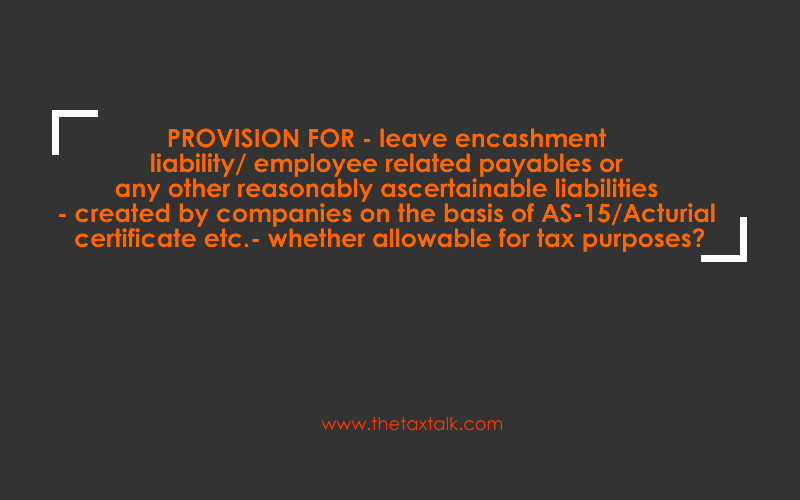![]()
PROVISION FOR – leave encashment liability/ employee related payables or any other reasonably ascertainable liabilities – created by companies on the basis of AS-15/Acturial certificate etc.- whether allowable for tax purposes?
- Hon’ble Supreme Courtin Bharat Earth Movers v. CIT [2000] 245 ITR 428 (SC) while deciding on the allowibility of provision for leave encashment, held that,
“If a business liability has definitely arisen in the accounting year, the deduction should be allowed although the liability may have to be quantified and discharged at a future date. What should be certain is the incurring of the liability. It should also be capable of being estimated with reasonable certainty though the actual quantification may not be possible. If these requirements are satisfied the liability is not a contingent one. The liability is in praesenti though it will be discharged at a future date. It does not make any difference if the future date on which the liability shall have to be discharged is not certain.”
In this regard Clause (f) of Section 43B acquires significane [Inserted by F.A. 2001 w.e.f. A.Y. 2002-03 i.e. after SC judgement], according to which deduction in respect of any sum payable by assessee as an employer in lieu of any leave at the credit of his employee shall be allowed only in the year in which it is actually paid.
Thereafter, in 2007, Hon’ble Calcutta High Court in Exide Industries Ltd. v. Union of India (292 ITR 470) struck down section 43B(f) being arbitrary, unconscionable and de hors Apex Court decision in case of Bharat Earth Movers (supra).
IT Dept. filed SLP against the above decision which has been admitted by Hon’ble Supreme court and Supreme Court has stayed the operation of the judgment of the Calcutta High Court in the case of Exide Industries Ltd. till final decision, which is pending as on date.
- Therefore, during the period of stay on the operation of Calcuta High Court judgement, whether clause (f) of section 43B is operative across India?
YES. From a reading of the Supreme Court order, it is clear that section 43B(f) is in the statute book during the pendency of the civil appeal. It cannot be said that section 43B(f) is in respect of only those assessees before the Supreme Court & it is to be observed by all til final verdict by Supreme Court. [Mysore Sales International Ltd. vs. CIT [2012] 23 taxmann.com 241 (Bang.)]
Similar View (against the assessee): Popular Vehicles & Services Ltd. vs. DCIT [2014] 51 taxmann.com 126 (Cochin – Trib.), ALCATEL vs. DCIT (2015) 70 SOT 818 (Delhi), ACIT vs. INDIA Cements Ltd. (2016) 46 CCH 5 (Chennai) etc.]
- Views in favour of assessee:-
Not so persuasive: “Provision made for leave encashment cannot be disallowed on basis of clause (f) of section 43B in view of the decision of Cal. High Court in Exide Industries Ltd. case.” [Eimco Elecon (India) Ltd. vs. ACIT [2013] 33 taxmann.com 476 (Ahmedabad)]
Thought Provoking: “A perusal of Sec. 43B(f) shows that the explanation to Sec. 43B referring to the amendment of the word any sum payable is applicable only for clause (a) of Sec.43B which means that it is not applicable for clause (f). Hon’ble Andhra Pradesh High Court in the case of Srikakollu Shubbarao & Co.173 ITR 708 has held that in order to apply the provisions of Sec. 43B not only should be the liability to pay the tax or duty be incurred in the accounting year but also should be statutorily payable in the accounting year. In our considered opinion, the provision for leave salary is not a statutory liability but only a contractual liability which is payable only if the employees resigns or retired from the services.We also find that the Hon’ble Calcutta High Court in the case of Excide Industries Ltd. has struck down Sec. 43B(f) being arbitrary, unconscionable and dehors the Apex Court decision in the case of Bharat EarthMovers (245 ITR 428). …… In view of the above, we direct the AO to allow the claim of provisions for leave salary.” [Aditya Birla Nuvo Ltd. vs. ACIT (2015) 68 SOT 403 (Mumbai)]
- D) IMPACT OF ICDS w.e.f. A.Y. 2016-17:
Applicable ICDS: Standard X on Provisions, contingent liabilities and contingent assets:
A provision shall be recognised when:
(a) a person has a present obligation as a result of a past event;
(b) it is reasonably certain that an outflow of resources embodying economic benefits will be required to settle the obligation; and
(c) a reliable estimate can be made of the amount of the obligation.
If these conditions are not met, no provision shall be recognised.
Provision for leave encashment liability and other similar liabilities, if satisfies the above criteria, shall be allowed for tax purposes.
- WORD OF CAUTION: In the case of conflict between the provisions of the Income-tax Act, 1961 and this Income Computation and Disclosure Standard, the provisions of the Act shall prevail to that extent!!
[button color=”” size=”” type=”round” target=”” link=”https://thetaxtalk.com/”]home[/button] [button color=”” size=”” type=”round” target=”” link=”https://thetaxtalk.com/submit-article-publish-your-articles-here/”]Submit Article [/button] [button color=”” size=”” type=”round” target=”” link=”https://thetaxtalk.com/discussion-on-tax-problem/”]Ask Question [/button]

